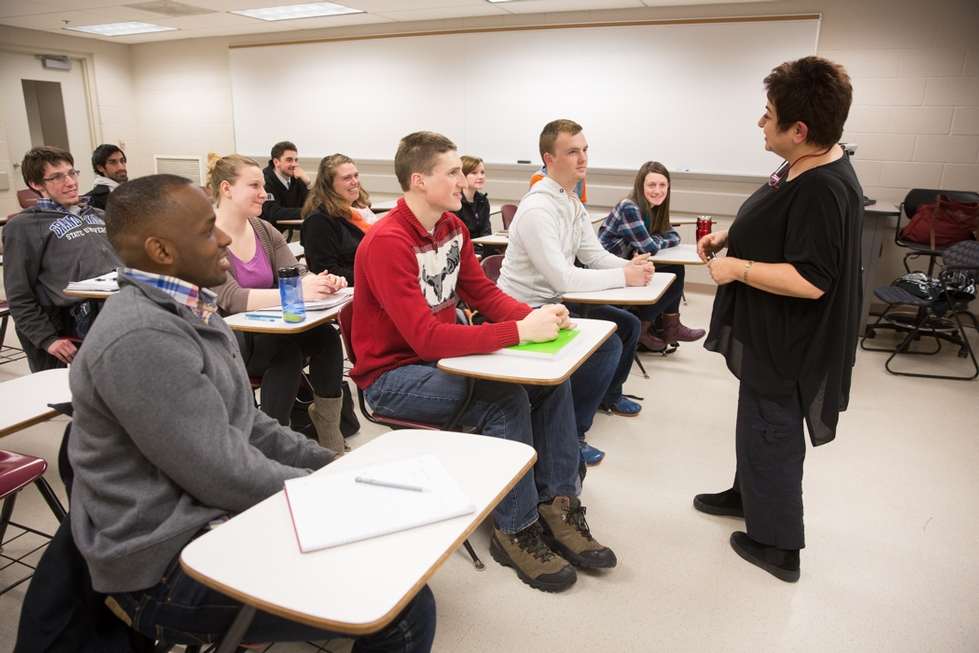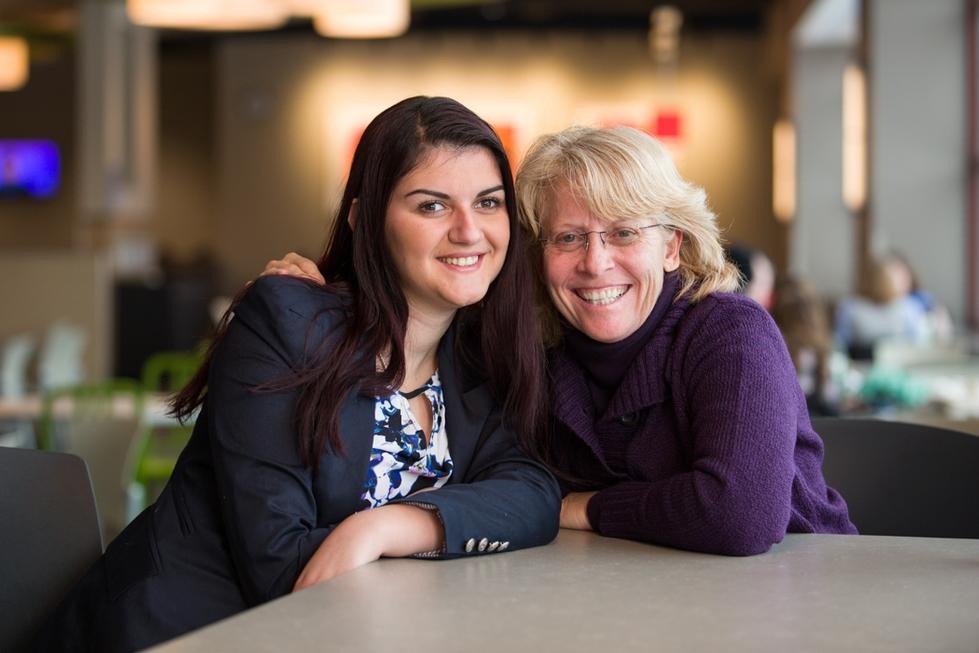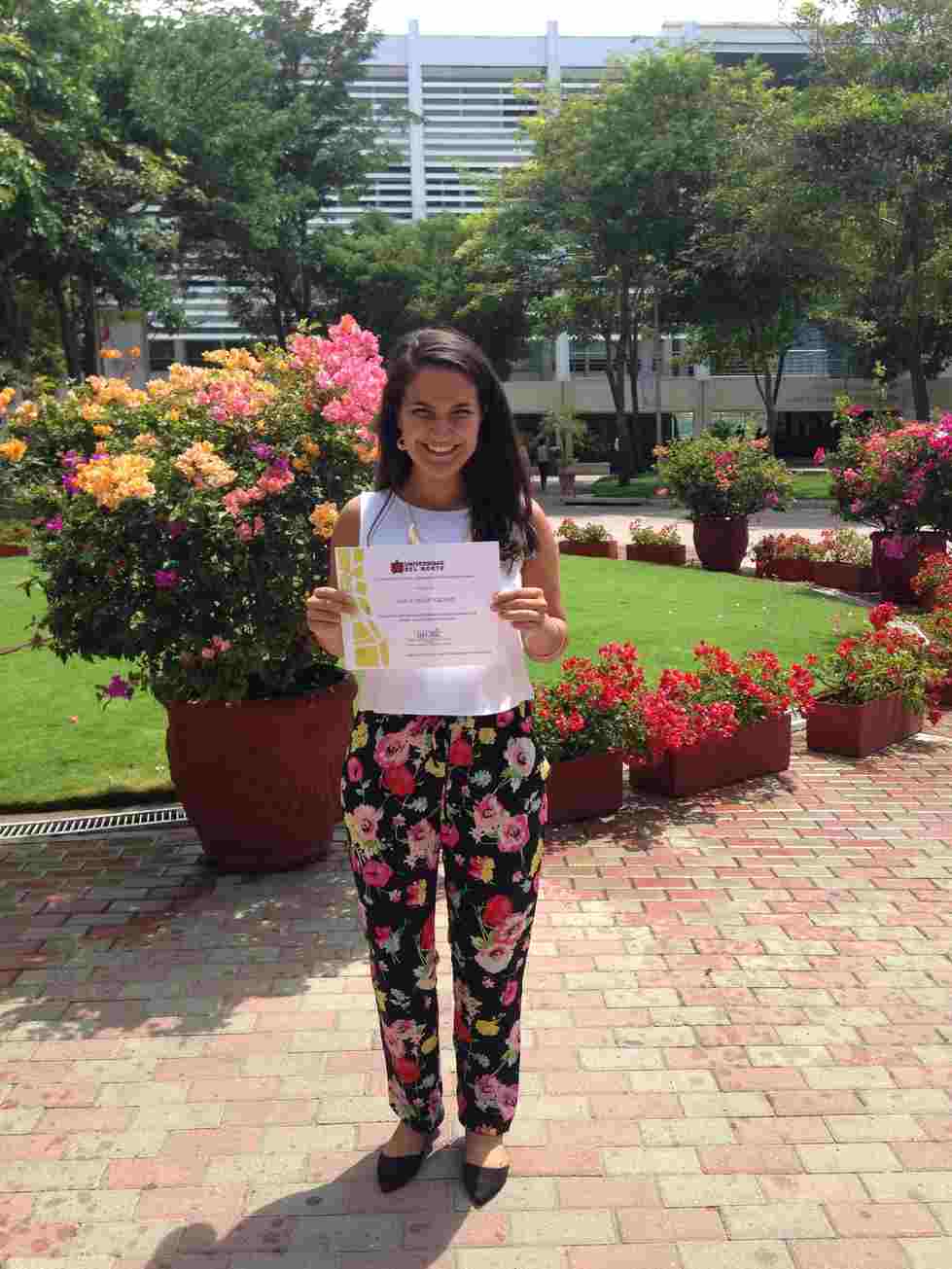Global GV
Internationalizing campus abroad and at home
A new campus initiative may make Grand Valley distinctive among its peers and give students an advantage when they search for jobs.
Global learning is not a new concept for U.S. colleges and universities. Today’s interconnected and diverse world requires workers to have the skills and knowledge needed to operate effectively among different cultures, religions and ethnicities.
Grand Valley leaders began exploring how best to make global learning a campus priority three years ago. A task force concluded its work last year and recommended a strategic process to infuse global learning across the undergraduate curriculum. In 1989, a similar recommendation was mandated within the General Education program.
Mark Schaub, chief international officer, co-chaired the task force and said talking to university leaders about global learning for all undergraduates was a rather easy sell. Provost Gayle R. Davis approved it last April.
“This will make the education that students get at Grand Valley more impactful and more distinctive,” Schaub said. “This is years in the making, but it will greatly set undergraduate education at Grand Valley apart from other institutions.”
Of course, many degree programs already address global learning, whether it means requiring a foreign language for degree completion, or teaching nursing students about patient care in other countries. The next step, Schaub said, is to survey each program to find the level of global learning offered.
Carol Sanchez, professor of management and director of international business programs for the Seidman College of Business, also co-chaired the task force. For the survey, Sanchez said the task force created five levels of globalization for a program, major or course. The levels range from learning facts about other countries (level 1) to requiring students to complete an internship overseas (level 5).

photo by Rex Larsen
Mahinur Akkaya, from Middle East Technical University in Turkey, talks with chemistry students during her exchange visit in January.
“Our scope for global learning is limited in terms of resources, but we can make an impact on academics,” Sanchez said.
Schaub said while it’s easy to embrace the idea of incorporating global learning in a curriculum it can be difficult for some departments to do so. “People want to do this and see the value in it, but they worry about how to do it,” he said.
Chemistry professor Todd Carlson said because the chemistry curriculum is essentially the same for college students worldwide, it’s hard to infuse global learning within Grand Valley’s program. “Our focus has been to globalize the experience for our students and faculty members through international partnerships, taking advantage of the fact that science is a universal and global activity,” Carlson said.
In late January, the department hosted a faculty member from Middle East Technical University in Turkey. Mahinur Akkaya taught a special topics course and led seminars for students interested in studying at METU. Carlson said Akkaya was his host when he visited Turkey on a Faculty/Staff Exchange Grant he received from Grand Valley’s Padnos International Center.

photo by Amanda Pitts
Ina Agastra, left, and Sue Korzinek met through the ‘Fit the Mitt’ program and remain friends.
“Every major science research center and university in the world will involve scientists and students from every corner of the globe working together,” he said.
Carlson and other chemistry faculty encourage their students to participate in study abroad programs but he said few students do, largely because of the structured labs and required courses needed to graduate. “In order to study abroad, they need to find a university where they can take science courses taught in English that align with the same courses they would be taking at Grand Valley,” he said. “I found that of all our partner institutions, METU is a good fit for our science majors.” The department also has a relationship with a university in Romania.
Grand Valley has nearly 30 partnerships with institutions in 19 countries. The partnerships represent a large piece of the global puzzle, as institutions serve as host for student, faculty and staff exchanges, and as a student’s home campus during a study abroad experience.
Study abroad
More than 700 students participated in study abroad programs during the 2013-2014 academic year. For that recording year, the university was ranked 10th among master’s degree institutions and third in Michigan for study abroad, according to the Institute of International Education.
The Padnos International Center staff members advise and guide students through a seemingly endless number of 4,000 study abroad program choices. Students can choose from faculty-led programs, internships or independent study programs, and stay in another country for two weeks or up to an entire academic year. Scholarships and grants are available to help defer expenses; 15 specific programs actually cost less than a semester at Grand Valley.
Kayla Pollard spent six months living with a host family in Barranquilla, Colombia, during the winter 2014 semester. Pollard is a Spanish major with a minor in public relations/advertising and said she wanted to be immersed in a Spanish-speaking culture. She tested so well in the language that she took all but one of her classes with native Colombians.
The skills Pollard learned served her well during an internship she had with Fiat Chrysler Automobiles in Auburn Hills. She worked in the company’s multicultural division for a supervisor who was born in Colombia.
“It was so nice to have the cultural background that came from my study abroad and go to Fiat Chrysler and get to work with national and Detroit-area advertising agencies,” Pollard said.
Pollard, from Oxford, said it’s unusual to major in Spanish and have no aspirations to teach the language, but she has an answer for people who ask about her career plans.
“Slowly, the Spanish population is becoming the majority. I understand the culture and how they work as a population,” she said. “This will benefit me in whatever I do.” After graduating in April, Pollard is now completing another internship with Fiat Chrysler, this time in Irvine, California, where she is gaining experiences in multicultural advertising and dealership relations.
Denise Debouvre works in human resources for Fiat Chrysler and said the company does not require applicants who are recent college graduates to have international experience, but those who do might have an advantage.
“If a student or recent graduate has looked at international markets in terms of marketing, performed a case study, or can speak to international markets’ demands, it would show our hiring managers that the candidate understands the intricacies of our international business,” Debouvre said.

Kayla Pollard spent a semester in Colombia.
In her role at the Seidman College of Business, Sanchez has a lot of contact with business leaders in West Michigan who, she said, echo Debouvre’s comments about why workers with global talents are needed.
“They tell our students that it’s very important even to companies that don’t have offices overseas,” Sanchez said.
“Your company might be supplying or sourcing out materials internationally. It’s important to our country to have a globally competitive workforce.”
Fulbright scholars
In February, the Chronicle of Higher Education ranked Grand Valley second among its peers for the number of faculty members who are Fulbright Scholars, and tied for 12th place for the number of student Fulbright Scholars. Administered by the U.S. State Department, the Fulbright program is the flagship of the country’s international educational exchange programs.
For the current academic year, three Grand Valley faculty members and four students earned Fulbright awards. Russell Rhoads, associate professor of anthropology, earned a Fulbright award to teach and conduct research in Sierra Leone. But that country’s Ebola crisis had Rhoads reassigned to Uganda, with two weeks to prepare. He said the transition worked well thanks to support teams in the U.S. and Uganda. Rhoads is teaching graduate students at Makerere University and training researchers at Advocates Coalition for Development and Environment, an NGO think-tank.
Global learning at home
Global learning doesn’t only happen in another country. Programs and practices already established on campus have built the framework to make Grand Valley a global learning community, Schaub said.
The list is extensive and includes international faculty members, like Akkaya, who teach or conduct research; diversity among students, faculty and staff members; international students who enroll at Grand Valley for a semester or to complete a degree program; cultural programs sponsored by campus departments; and mentoring programs. “Fit the Mitt” is a mentoring program that pairs a faculty or staff member with a new international student. The program started two years ago as an avenue to improve retention for international students and keep them engaged and connected.
Faculty and staff members who volunteer for Fit the Mitt are encouraged to meet their students regularly for coffee or lunch. One year ago, Sue Korzinek, director of Information Technology, was paired with Ina Agastra, from Albania. They met once for lunch in September and had planned to meet again, then Agastra had a bicycle accident that fractured her clavicle, shattered several bones and broke two vertebrae in her back.
Agastra said it was her new friend on campus who helped her recover. “Sue came to the hospital the moment she heard what had happened to me and she kept visiting, we became really close,” said Agastra, a double major in finance and information systems. “She was there when I most needed people in my life. I didn’t have anyone here — no family, no friends.”
Korzinek said their friendship grew after Agastra was released from a rehabilitation center. They continue to meet for meals or, for example, a Grand Rapids Griffins hockey game.
“I admire Ina for her resilience, determination and attitude despite what happened to her, and am so thankful that she is a part of my life and will always be a part of my life,” Korzinek said.
Agastra now has a campus job working for the IT department as part of the desktop support team. She said acclimating to an American university was easier because of Fit the Mitt. “Having someone to talk to about your concerns and struggles is good. Your mentor can help you understand the culture and guide you through the process of adapting to a new country,” she said.
“I admire Ina for her resilience, determination and attitude despite what happened to her, and am so thankful that she is a part of my life and will always be a part of my life.” — Sue Korzinek
Next steps
Forty years ago, Grand Valley, under then-President Arend D. Lubbers, established its first international partnership with Poland’s Cracow University of Economics.
Global learning at Grand Valley will continue to have a visible presence on campus in several years, said task force co-chair Sanchez. A prioritized timeline includes steps such as enhancing faculty resources for internationalization, increasing the number of international students and assessing global learning methods. Learn more about the report at www.gvsu.edu/internationalization.
“We have one mantra: global learning in every major,” Sanchez said. “We need to brand it; this could be Grand Valley’s selling point, what distinguishes it from other universities.”
